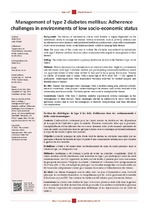Management of type 2 diabetes mellitus: Adherence challenges in environments of low socio-economic status
Abstract
BACKGROUND: The efficacy of treatment for clients with diabetes is highly dependent on the individual’s ability to manage the disease. Several constraints, such as poverty, illiteracy and insufficient resources (finances and specialised healthcare professionals), especially communities of low socio-economic status, could influence clients’ ability to manage their disease.
AIM: The main aim of this study was to outline the obstacles encountered by individuals with type 2 diabetes mellitus from an urban community with regard to management of their disease. Setting: The study was conducted at a primary health care facility in the Western Cape, South Africa. Methods: Ethical clearance was obtained from all relevant authorities. Eight (8) conveniently selected clients with type 2 diabetes mellitus per participating community healthcare centre (six approved centres in total) were invited to take part in focus group discussions. Twenty six clients, 15 females and 11 males, with a mean age of 58.92 years (SD = 7.33), agreed to participate. Audiotaped data were transcribed verbatim followed by content analysis and identification of themes.
RESULTS: Themes that emerged were challenges with: a healthy eating plan, physical activity, financial constraints, other people’s understanding of the disease, and service received at the community healthcare centre. Verbatim quotes were used to exemplify the themes.
CONCLUSION: Clients with type 2 diabetes mellitus experienced several challenges in the management of their disease. These challenges should be addressed to assist with better glycaemic control and to curb the emergence of diabetic complications and their attendant cost implications.

